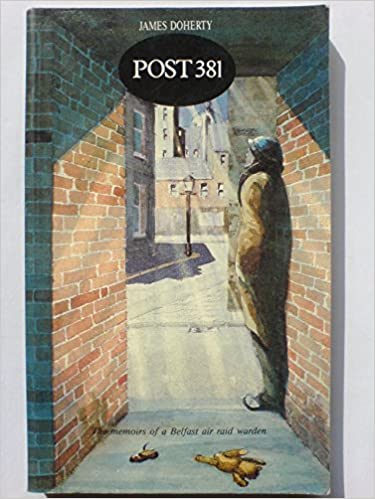
James Doherty’s account is his experience as an air raid warden in north Belfast during the Belfast Blitz in Second World War.

The Belfast Blitz consisted of four aerial bombing raids by German aircraft that occurred between 7th April and 6th May 1941. The raids killed over 900 people, injured 1,500 and damaged about half of the city’s homes. Thousands were made homeless and around 140,000 residents fled to the country (a third of the city’s population).[1]
Doherty was born in 1920 into a Catholic family in Nelson Street, north Belfast.[2] Aged 16, he started as an apprentice upholsterer with a firm in Percy St.[3] He enlisted in the Air Raid Precautions (ARP) scheme before the war. He joined because ‘I was now nineteen and had some experience of working in the community with a church organisation. Civil defence seemed important, so I volunteered along with my friends.’[4] He became part of an ARP post in Cranburn St, near Carlisle Circus. It was known as Post 381 and served as the title of his memoir.[5]
He was proud of being part of the service.[6] He said that there were many that gave the ARP the ‘Dad’s Army image, but the prince and the beggar, the fools and the sages all went to make up a great service.’[7] He recalled that his post had a strong sense solidarity and comradeship and these bonds ‘led us to trust in each other and that gave us strength and resolution to carry out horrible and fearful tasks’.[8]
He recalls the Easter Raid that took place on 15/6 April 1941. During the raid, he was nearly killed by a German parachute mine that destroyed a fellow ARP post in Trinity Street, near his own post. When the bomb detonated ‘the whole world seemed to rock; slates, bricks, earth and flying glass rained down on…But by a miracle we were alive’.[9] As a consequence of the raid, large numbers of houses were destroyed, including his own home. He recalled ‘what had been a row of neat terrace houses was now a mountain of rubble. I was stood gazing at the mound which was once my home’[10] During the night he and his were called on to perform the roles of ‘doctor, fireman, rescuer and counsellor’.[11]
After the Easter Raid, Belfast descended into mass panic which became a ‘wild rush’ to leave the city.[12] For those left in Belfast, life became difficult. Doherty recalled: ‘There were no milk or bread deliveries…Water was unfit for use owning to pollution from serwage…Lavatories were not to be used…Gas was used throughout the city as the means for cooking and lightening but such was the damage to the mains that it had to be turned off in the damaged areas, leaving unfortunate residents without lighting or cooking facilities’.[13]
Doherty gives a grizzly description of his work to prepare unidentified bodies for identification by relatives. He sorted and cleaned corpses at the Falls Road public baths that were being used as a temporary mortuary.[14] He said his experience of working in the mortuary were ‘grim, heart-breaking experiences that never be forgotten’.[15]
This is an amazing and rare account. It complements Brian Moore’s novel which is based on Moore’s own experience as an ARP warden working in the same area as Doherty. It is quite probable that they may have known each other.[16]
[1] Brian Barton, Belfast in the War Years, Belfast in the War Years (Belfast: Blackstaff Press, 1989), p.233.
[2] James Doherty, Post 381, The memoirs of a Belfast air raid warden (Belfast: Friar’s Bush Press, 1989), p.1.
[3] Ibid, p.1.
[4] Ibid, p.2.
[5] Ibid, p.6.
[6] Ibid, p.6.
[7] Ibid, p.7.
[8] Ibid, p.10.
[9] Ibid, pp.27-28.
[10] Ibid, p.30.
[11] Ibid, p.88.
[12] Ibid, p.69.
[13] Ibid, p.69.
[14] Ibid, p.53.
[15] Ibid, p.51.
[16] Brian Moore, Emperor of Ice Cream (London: Turnpike Books 2021 [originally pub 1965]).

